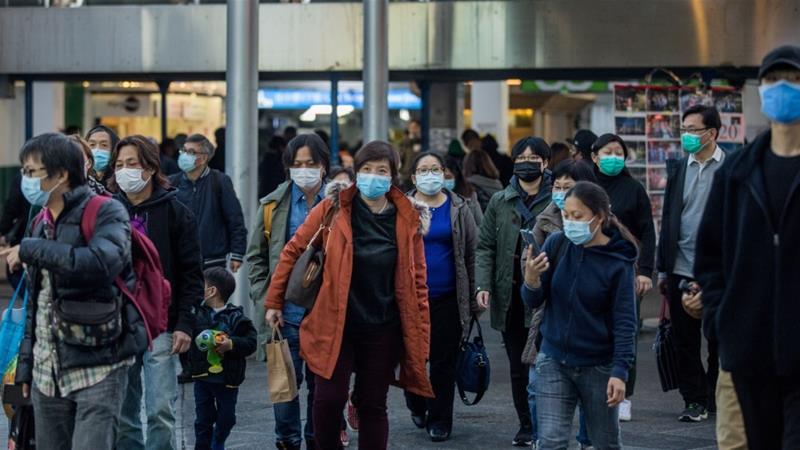Investors pin their hopes on central bank stimulus measures as policymakers try to limit virus’s economic fallout.
Asian shares and United States stock futures edged up cautiously on Wednesday, as investors tried to shake off worries about the coronavirus epidemic and look beyond the short-term hit to corporate earnings.
Chinese blue chip shares erased early declines to trade 0.52 percent higher. Australian shares were up 0.29 percent, while Japan’s Nikkei stock index rose 0.81 percent.
MSCI’s broadest index of Asia Pacific shares outside Japan spent much of the morning session bouncing between gains and losses, losing 1.08 percent by midday.
China, the world’s second-largest economy, is still struggling to get its manufacturing sector back online after imposing severe travel restrictions to contain a virus that emerged in the central Chinese province of Hubei late last year.
On Tuesday, Apple Inc announced that it was unlikely to meet its sales guidance because of the virus outbreak, spooking investors and denting stock prices.
But investors are optimistic that officials will roll out more stimulus to support the world’s second-largest economy.
“Apple’s announcement was a bit of a shock, but … what’s more important is that central banks are going to provide quite a bit of stimulus,” Stephen Innes, Asia Pacific market strategist at AxiTrader told Al Jazeera.
“We know there’s going to be a slide in earnings, we know those ramifications,” he said, adding that these were expected short-term outcomes, but earnings could recover in the medium to long term. “Central banks will buttress short-term downside with a lot of liquidity.”
The People’s Bank of China cut the interest rate on its medium-term lending facility on Monday, which is expected to pave the way for a reduction in the country’s benchmark loan prime rate on Thursday, as policymakers try to ease the financial strains caused by the virus.
“Part of the thinking that is supporting markets is the actions that China takes to support its economy,” Michael McCarthy, chief market strategist at CMC Markets in Sydney told Reuters. “Any investor concern around impact on demand globally from the virus will be offset by expectations that global central banks will ride to the rescue.”
US stock futures rose 0.18 percent in Asia on Wednesday but the Treasury curve remained inverted as yields on three-month bills traded above those on 10-year notes, in a sign that some investors remain cautious about the outlook.
A yield curve inverts when short-term yields trade above long-term yields, and is often considered a sign of recession in the next year or two.
In the currency market, the euro languished at a three-year low versus the US dollar as disappointing data from Germany, Europe’s largest economy, has stoked fears that the eurozone is more vulnerable to external shocks than previously thought.
The euro was quoted at $1.0804, still close to its lowest since April 2017.
Mainland China had 1,749 new confirmed cases of coronavirus infections on Tuesday, the country’s National Health Commission said on Wednesday, down from 1,886 cases a day earlier and the lowest since January 29.
The death toll in China has topped more than 2,000 from the flu-like illness which has already spread to 24 other countries.
In China’s onshore market, the yuan briefly fell to a two-week low of 7.0136 per US dollar as traders continued to ponder the economic impact of the virus and the chance for more monetary easing.
The price of US crude oil rose 0.21 percent to $52.16 a barrel, while Brent crude rose 0.12 percent to $57.87 per barrel as a reduction in supply from Libya offset concerns about weaker Chinese demand for commodities.
Expectations that the Organization of the Petroleum Exporting Countries (OPEC) and allied producers including Russia will cut output further should lend support to prices.
The group, known as OPEC+, will meet in Vienna on March 6.













![Hotstar Premium Cookies 2019 [*100% Working & Daily Updated*] Hotstar Premium Cookies 2019 [*100% Working & Daily Updated*]](https://tahav.com/wp-content/uploads/2019/11/Hotstar-Premium-Cookies-Free-100x70.jpg)



